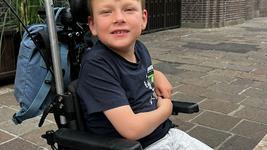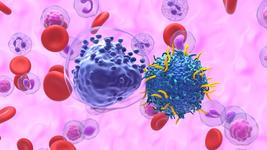Clinical Trial Roundup: Gene-Editing Therapies for Renal Cell Carcinoma
CMN Intelligence - The World’s Most Comprehensive Intelligence Platform for CRISPR-Genomic Medicine and Gene-Editing Clinical Development
Providing market intelligence, data infrastructure, analytics, and reporting services for the global gene-editing sector. Read more...
Renal cell carcinoma (RCC) is a type of kidney cancer that develops in the lining of the very small tubes (tubules) in the kidneys. Although rare, RCC is the most common type of adult kidney cancer, counting for about 90 % of all cases (see Fact Box). This update looks at two ongoing clinical trials sponsored by Allogene Therapeutics and CRISPR Therapeutics for gene-edited therapy candidates for RCC.
ALLO-316: A TALEN-edited CAR-T cell therapy for renal cell carcinoma
Allogene Therapeutics is developing ALLO-316 to treat renal cell carcinoma (RCC) as well as several blood cancers that express the cell-surface antigen CD70. The expression of CD70 is limited in healthy tissues, which makes it an attractive anti-tumour target.
ALLO-316 is Allogene's first solid tumour candidate to reach the clinic, and it is currently being evaluated in the multi-center TRAVERSE Phase 1 clinical trial for safety, efficacy, and cell kinetics in adults with advanced or metastatic clear cell RCC.
TALEN-edited allogeneic cell therapy
ALLO-316 is an allogeneic cell therapy, i.e., it is generated in vitro from healthy donor T cells. Following isolation from donors, T cells are transduced with a lentivirus to express a CD70-targeting chimeric antigen receptor (CAR).
Cellectis’ TALEN® gene-editing technology is used under licence to further develop ALLO-316. The T cell receptor (TCR) locus, TRAC, in the donor-derived cells is disrupted to eliminate the risk of graft vs host disease. The CD52-encoding gene is also TALEN-disrupted in ALLO-316. This is a common feature for allogeneic CAR-T cell therapies, in which an anti-CD52 antibody is administered prior to CAR-T cell therapy to suppress the patient’s immune system and allow the CAR-T cells to stay engrafted for full therapeutic effect. CD52 disruption renders the CAR-T cells resistant to this treatment.
The TRAVERSE trial is expected to enrol 120 adult participants, who will each receive a single dose of intravenously adminstered ALLO-316 after a lymphodepletion regimen comprising fludarabine, cyclophosphamide, and Allogene’s CD52 monoclonal antibody, ALLO-647.
Pre-clinical data for ALLO-316 supports anti-tumour potential
Allogene presented pre-clinical data for ALLO-316 in models of acute myeloid leukaemia (AML) at the American Hematology Society (ASH) in late 2020. Here, they reported that CD70 expression was detected on AML cell lines and primary samples from AML patients, but not in haematopoietic stem cells. ALLO-316 was able to kill leukaemic cells in multiple animal models, and this activity was abolished in CD70-deficient models. While activated T cells usually express CD70, the company reported that ALLO-316 CAR-T cells did not express CD70, likely because the CAR masks CD70 on the cell surface. This is important because it enhances persistence by minimising the risk of the ALLO-316 cells targeting themselves. The company also published encouraging pre-clinical data for ALLO-316 in Cancer Research in 2022. You can read more ALLO-316 in an earlier clinical update here.
Allogene Therapeutics announced in March 2022 that the FDA had granted Fast Track Designation for ALLO-316, for the treatment of RCC in patients where standard therapies have failed. The FDA's Fast track process is designed to facilitate the development and speed up the review of certain drugs to treat serious conditions and fill unmet medical needs.
Initial clinical data shows promise for ALLO-316 in RCC
At a company R&D showcase in November 2022, Allogene Therapeutics presented initial data from the TRAVERSE trial demonstrating promising anti-cancer activity in the subset of nine patients with confirmed CD70-positive RCC. As of the data cutoff date of November 17th, 2022, the disease control rate (DCR) in patients who were CD70+ was 100%, including three patients who achieved a partial response (PR) (two confirmed and one unconfirmed with the longest response lasting until month eight). The company also reported that CAR-T cell expansion in patients with CD70 positive RCC was robust, and there was a trend toward greater tumour shrinkage in patients with high levels of CD70 expression.
Across all patients treated wih ALLO-316 in the trial, a generally manageable safety profile with no graft vs host disease was observed. In a recent press release, Allogene revealed that it is deploying a new investigational in vitro companion diagnostic assay designed to prospectively assess CD70 expression levels in patient tumours, to enhance patient selection in the TRAVERSE trial. Subject to trial results, the company intends to complete planned dose exploration and initiate expansion cohort enrollment in 2023. Allogene may also investigate ALLO-316 for other CD70-expressing solid tumours and haematologic indications, or in combination with other anticancer therapies such as immune checkpoint inhibitors.
Renal Cell Carcinoma
Renal cell carcinoma (RCC) occurs most often in males ages 60 to 70 years old, and comprises several disease subtypes, with symptoms including but not limited to passing blood in urine, abdominal pain and abdominal mass, high blood pressure, anaemia, and fever. Some individuals remain symptom-free.
RCC is usually diagnosed via CT scaning or sonography. Early diagnosis and disease staging is critical to initate appropriate treatment as early as possible. The exact cause of RCC is unknown although smoking and certain pre-existing kidney diseases are among the established risk factors. Patient prognosis varies greatly depending on many factors including age and stage of disease upon diagnosis. Treatment depends on type and stage of disease, and typically involves a combination of surgical removal of tumours, hormone treatment to shrink tumours, and chemotherapy.
Source: www.rarediseases.org
CTX130: A CRISPR-edited CAR-T cell therapy for renal cell carcinoma
CRISPR Therapeutics is developing CTX130 for the treatment of RCC as well as relapsed or refractory T or B cell cancers, including certain lymphomas. The candidate is currently being assessed in 2 single-arm, open-label, multicenter Phase 1 studies: one to evaluate safety and efficacy in relapsed or refractory T or B cell cancers and the other, the COBALT™-RCC study, to evaluate safety and efficacy of several dose levels in RCC.
CTX130 is an allogeneic CAR-T cell therapy that, like ALLO-316, is designed to target the cell-surface antigen CD70. The therapeutic candidate is developed using T cells from healthy donors that undergo several ex vivo CRISPR-Cas9 modifications to make the product suitable for off-the-shelf CAR-T cell therapy.
Firstly, CRISPR-Cas9 is used to engineer the CAR that allows the CTX130 cells to target and kill CD70-expressing cells.
CRISPR-Cas9 is also used to insert the anti-CD70 CAR construct precisely into the TRAC locus. This move disrupts the native TCR, thus mitigating the risk of graft-vs-host disease (GVHD) that may otherwise result from histo-incompatibility between a donor and recipient. This edit also places the CAR under endogenous TCR regulation.
CRISPR-Cas9 is further used to eliminate the class I major histocompatibility complex (MHC I) expressed on the surface of the CTX130 cells. This edit alleviates the risk of the patient rejecting the CAR-T product via MHC I, thus increasing the likelihood of the therapy persisting in the patient’s blood.
Promising initial clinical data for CTX130 in RCC
At the Society for Immunotherapy of Cancer (SITC) 37th Annual Meeting in November 2022, CRISPR Therapeutics shared results from the Phase 1 COBALT™-RCC study. In this presentation, the company disclosed the first reported complete response in a solid tumour setting using an allogeneic CAR-T candidate. The clinical results demonstrated a tolerable safety profile with no unexpected on-target off-tumour toxicities and encouraging anti-tumour activity, with a 77% disease control rate in heavily pretreated patients. The company has also disclosed that it is further developing CTX130 with second-generation edits. The resulting candidate, CTX131, is subjected to regnase-1 and TGFβR2 disruption, which together increase potency at least 10x in pre-clinical models. The company plans to ininiate clinical studies of CTX131 in 2023.
We strive to keep you updated with clinical and pre-clinical news from the CRISPR Medicine field. For a complete overview of current gene editing clinical trials, check out CRISPR Medicine News' Clinical Trials Database.
This article was originally published on 6th April 2022. It was updated and republished on 1st March 2023 to reflect updates for both the TRAVERSE and COBALT-RCC trials.
To get more of the CRISPR Medicine News delivered to your inbox, sign up to the free weekly CMN Newsletter here.
Tags
ArticleClinical News UpdatesRenal Cell CarcinomaCancerAllogene Therapeutics, Inc.CRISPR Therapeutics AGTrials
CLINICAL TRIALS
Sponsors:
Base Therapeutics (Shanghai) Co., Ltd.
Sponsors:
Base Therapeutics (Shanghai) Co., Ltd.







